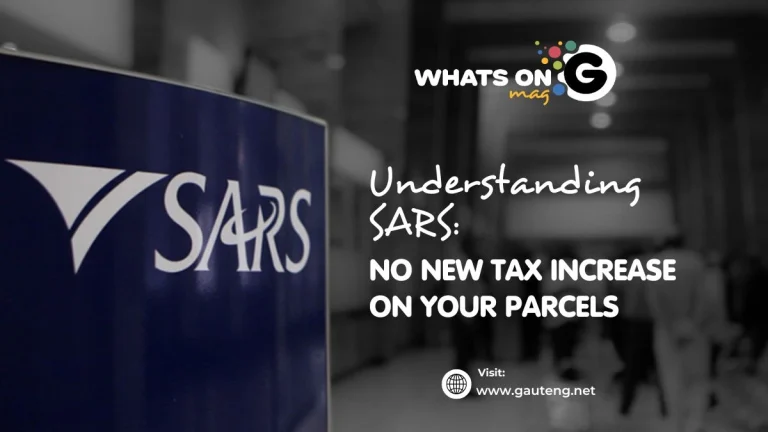South Africans have raised concerns in 2025 about rumours of a new parcel tax linked to growing e-commerce and postal deliveries. However, the South African Revenue Service (SARS) has not introduced any new tax specifically targeting parcels. Instead, parcel deliveries remain subject to South Africa’s existing tax framework, which covers customs duties and Value-Added Tax (VAT).
Thank you for reading this post, don't forget to subscribe!This article breaks down how parcel taxation works in 2025, clarifies recent changes, and explains what both consumers and businesses should know.
READ MORE: Tax Season Scams on the Rise: How to Protect Yourself in 2025
Table of contents
No Dedicated Parcel Tax Introduced in 2025
There is no new “parcel tax” or levy in place this year. Tax rules for goods delivered by post or courier remain the same as those applied under South Africa’s VAT system and customs legislation.
Taxpayers should note that SARS can only collect taxes set out in law. It cannot impose new charges outside existing statutes, such as the Value-Added Tax Act and the Customs and Excise Act.
Customs Duties and VAT on Imported Parcels
Imported parcels remain subject to two main costs:
- Customs duties: Charged based on the tariff classification of the goods. Rates vary depending on the product type and origin.
- VAT at 15%: Calculated on the total landed cost of the parcel, including the customs value, shipping, insurance, and duties.
Until August 2024, imported parcels under R500 were exempt from VAT and duties. This exemption ended on 1 September 2024, when South Africa aligned with global trade norms. Now, all imported parcels, regardless of value, are subject to VAT and, where applicable, customs duties.
This means that even low-value online shopping parcels face VAT, ensuring fair competition with local businesses.
VAT and Domestic Parcel Deliveries
For parcels shipped within South Africa, no separate parcel tax applies. Instead, VAT is charged at the standard rate of 15% on most goods and services sold by VAT-registered businesses.
The VAT is already included in the sale price of goods. Customers do not pay a separate “parcel tax” when buying from local companies.
VAT Rate in 2025
In the 2025 National Budget, government briefly proposed raising VAT to 15.5% in March and then to 16% in April. However, this was met with public and business opposition, and the increase was rescinded in April 2025.
The VAT rate for 2025 therefore remains at 15%, unchanged since 2018.
How SARS Enforces Parcel Taxes
SARS has been modernising its customs and tax systems to improve compliance:
- Electronic declarations: All imports must be properly declared to customs.
- Automated risk checks: Systems flag suspicious shipments for inspection.
- Stricter low-value parcel rules: With the R500 exemption removed, all imports face VAT.
These changes are designed to close loopholes, protect local industries, and ensure fairness in tax collection.
Seller Responsibilities
Businesses selling goods delivered by parcel must:
- Register for VAT if their turnover exceeds the legal threshold.
- Collect 15% VAT on taxable goods.
- Remit VAT to SARS in line with filing requirements.
Failure to do so risks penalties, audits, and reputational damage.
Consumer Responsibilities
South African consumers should:
- Check whether VAT is included in online purchases.
- Be prepared to pay customs duties and VAT on imported parcels above R0 (since the R500 exemption ended).
- Avoid unverified claims of “extra parcel taxes,” which often spread on social media.
Impact on E-Commerce and Deliveries
The end of the R500 VAT exemption has been particularly relevant for the e-commerce sector. Low-value imported goods now attract VAT, helping level the playing field for South African retailers who already charge VAT on their goods.
For consumers, this means parcels from overseas may now be more expensive than before September 2024. However, the system ensures more consistent tax treatment across goods.
Staying Informed
To avoid confusion, taxpayers should:
- Follow SARS updates on its official website or social media.
- Consult registered tax practitioners for advice on parcel-related taxes.
- Report misinformation directly to SARS.
Confused by tax jargon? Tax Terms Explained: IRP5, ITA34, ITR12, and More in Plain English. Get clear, simple explanations of the most common SARS tax terms to help you file with confidence.
What This Means for You
There is no new parcel tax in 2025. Instead, the key rules are:
- Imports: All imported parcels are subject to VAT at 15%, plus customs duties where applicable.
- Domestic sales: VAT is charged at 15% on most goods, already included in the price.
- No hidden taxes: SARS cannot impose taxes outside the laws of Parliament.
Understanding these rules helps both businesses and consumers avoid misinformation, comply with the law, and make informed decisions about online shopping and parcel deliveries.




